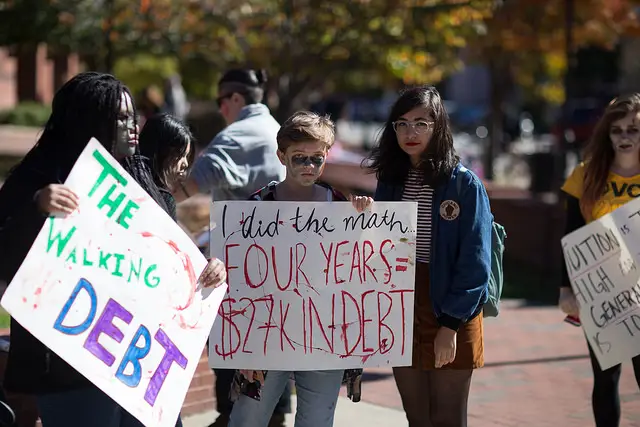Among American millennials who identify politically as Democrat or Independent, forgiving student debt is a top political priority.
According to a new Ipsos survey, for 24 percent of millennial respondents, student debt forgiveness is a top-tier policy issue, along with Medicare for All and instituting universal background checks for gun purchases.
The market research company interviewed 2,008 adults from the continental U.S., Alaska, and Hawaii between May 8 to May 13, 2019. The sample included 1,640 registered voters, 469 millennial registered voters, 428 Generation X registered voters and 743 baby boomer registered voters.
88 percent of those surveyed asked for lower interest rates on student loans, with the majority of non-millennial voters, ages 39-54, in support. Millennial voters were also supportive of a federally funded program that would fully pay for any student seeking a 4-year degree.
Among millennial voters, support for using a wealth tax to fund student loan debt forgiveness is quite high in comparison to older generations.
When it comes to borrowing money to pay for college, nearly 54 percent of millennial voters and 40 percent of registered voters reported taking out loans. The survey found that people ages 55 and older borrowed less than millennials. Nearly 72 percent of baby boomers have paid off their debts, in comparison to only 31 percent of millennials.
Pete Buttigieg and Julián Castro, two candidates who are seeking the Democratic presidential nomination, recently released their respective campaign proposals to overhaul the education system in the country to make it more affordable and accessible.
Buttigieg proposed creating a federal partnership that will make public tuition affordable for all and completely free for those with lower household incomes. He also called for increasing Pell Grants which help students with basic living expenses and keep up with inflation.
Castro proposed eliminating tuition at public colleges, universities, community colleges, and technical and vocational schools, as well as investing $3 billion per year to provide financial support for low-income students at Historically Black Colleges and Universities (HBCUs) and other minority-serving institutions.
Students Optimistic About Futures Despite High Loan Debts [Survey]

